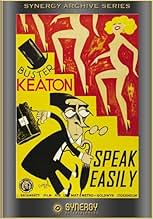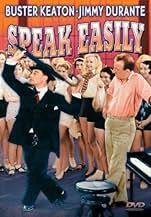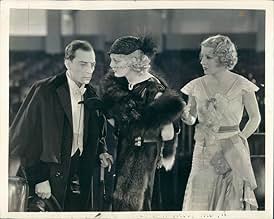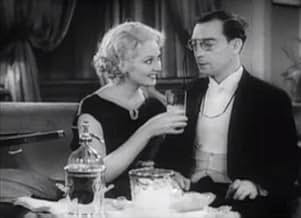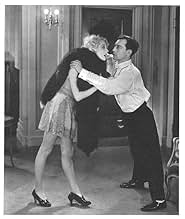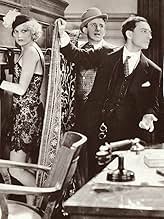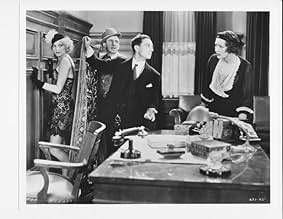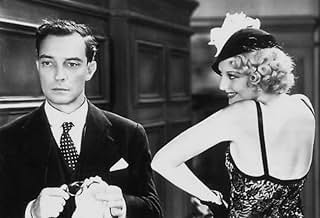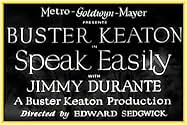VALUTAZIONE IMDb
5,8/10
1238
LA TUA VALUTAZIONE
Aggiungi una trama nella tua linguaA timid professor inherits a large sum of money and decides to fund a terrible musical.A timid professor inherits a large sum of money and decides to fund a terrible musical.A timid professor inherits a large sum of money and decides to fund a terrible musical.
- Regia
- Sceneggiatura
- Star
Loretta Andrews
- Chorus Girl
- (non citato nei titoli originali)
Oscar Apfel
- Lawyer's Representative
- (non citato nei titoli originali)
Reginald Barlow
- Billington
- (non citato nei titoli originali)
Jack Baxley
- Tom - Sheriff's Deputy
- (non citato nei titoli originali)
Sidney Bracey
- Jenkins
- (non citato nei titoli originali)
Jim Farley
- Station Agent
- (non citato nei titoli originali)
DeWitt Jennings
- Sheriff of Lincoln County
- (non citato nei titoli originali)
Fred Kelsey
- Process Server
- (non citato nei titoli originali)
Recensioni in evidenza
What is the most harrowing movie ever made? The gynaecological nightmare of 'Cries and Whispers'? The acid psychodramas of Fassbinder? The discomfiting black comedy of 'Last House on the left? I'm sure for that portion of the film-loving public that tie their masts to the good ship Buster Keaton, there is only one answer - any one of his sound films.
I don't know what flayed my soul more poignantly in this movie - the grounding of Keaton's intricate and expansive physical art to humdrum slapstick; the painful hesitation of this master filmmaker with dialogue - not that he hasn't a lovely, comic voice, or that he can't make dialogue funny; it's just that the studio don't seem to have given him enough takes, and so he seems to be trying to remember his lines before he delivers, which only makes him - Keaton, not his character, look silly; or is it the humiliation of seeing Keaton caught up in a tawdry sex farce, when he has given us some of the richest accounts of romantic frustration in film?
No, I know what was most disturbing - having to watch Buster Keaton, cinema's greatest comedian, sit aside to observe Jimmy Durante doing his schtick. It is horrors such as this that get yer Dantes composing yer Infernos.
MGM seem to have got the curious idea that the best way to adapt Keaton to sound was to turn him into a Marx Brother, complete with verbal pedantry, elaborate, tedious 'clowning', shambolic slapstick, theatrical setting, triumph through chaos, and Thelma Todd. Keaton was just not that sort of comic, and where Groucho's malicious tongue and gleeful opportunism might just have made this plot work, Buster's socially inept professor can't, he is too studied and predictable.
What Buster needed was to be allowed experiment like Lang in 'M', or Rene Clair; he would never have tried to hold back the tide like Chaplin. When a film like 'The General' is alluded to - messing about with trains - the loss becomes even more apparent.
And the thing is, in patches amid the flat direction, the film isn't all that bad - there is an excellent jolt when a camera on the bus leaves Keaton alone at a railway station; and the denouement, if hardly original, is at least livelier than what went before. There is something almost endearing about the way Keaton slows down a plot that needs all the zip it can get.
There is a film in here about loneliness, emotionally paralysing order, the numbing effects of education etc., struggling to get out. The best way to appreciate this film is to watch not the narrative of Professor TZ Post, but of emasculated genius Buster Keaton, trapped in a prison of mediocrity, confounded by new technology, mocked by a malevolent fate (in this case the studio), retaining a stoical grace. Looked at like that, it becomes a kind of masterpiece.
I don't know what flayed my soul more poignantly in this movie - the grounding of Keaton's intricate and expansive physical art to humdrum slapstick; the painful hesitation of this master filmmaker with dialogue - not that he hasn't a lovely, comic voice, or that he can't make dialogue funny; it's just that the studio don't seem to have given him enough takes, and so he seems to be trying to remember his lines before he delivers, which only makes him - Keaton, not his character, look silly; or is it the humiliation of seeing Keaton caught up in a tawdry sex farce, when he has given us some of the richest accounts of romantic frustration in film?
No, I know what was most disturbing - having to watch Buster Keaton, cinema's greatest comedian, sit aside to observe Jimmy Durante doing his schtick. It is horrors such as this that get yer Dantes composing yer Infernos.
MGM seem to have got the curious idea that the best way to adapt Keaton to sound was to turn him into a Marx Brother, complete with verbal pedantry, elaborate, tedious 'clowning', shambolic slapstick, theatrical setting, triumph through chaos, and Thelma Todd. Keaton was just not that sort of comic, and where Groucho's malicious tongue and gleeful opportunism might just have made this plot work, Buster's socially inept professor can't, he is too studied and predictable.
What Buster needed was to be allowed experiment like Lang in 'M', or Rene Clair; he would never have tried to hold back the tide like Chaplin. When a film like 'The General' is alluded to - messing about with trains - the loss becomes even more apparent.
And the thing is, in patches amid the flat direction, the film isn't all that bad - there is an excellent jolt when a camera on the bus leaves Keaton alone at a railway station; and the denouement, if hardly original, is at least livelier than what went before. There is something almost endearing about the way Keaton slows down a plot that needs all the zip it can get.
There is a film in here about loneliness, emotionally paralysing order, the numbing effects of education etc., struggling to get out. The best way to appreciate this film is to watch not the narrative of Professor TZ Post, but of emasculated genius Buster Keaton, trapped in a prison of mediocrity, confounded by new technology, mocked by a malevolent fate (in this case the studio), retaining a stoical grace. Looked at like that, it becomes a kind of masterpiece.
Keaton fans, you will not "die a thousand deaths" if you view this. Nothing Keaton does is bad, if for nothing else then for his presence. That being said, Buster was a silent start who was best when doing stuff created by his own mind. By 1932, the silent era was dead and the studios owned the movies. That Buster Keaton of "Seven Chances" and "Steamboat Bill Jr." was no more. That could never be recreated.
Times changed, films changed, and Buster adapted. Better this Buster than no Buster.
The story is funny, and there is some amusing slapstick. Buster plays his role well, adds some Buster to it, and is believable as a clueless college professor. Jimmy Durante is larger than life, in a hammy sort of way, but it's a good contrast with Keaton if anything. The movie works, and the closing scenes the show on Broadway is madcap with a modicum of brilliance.
We can ask what if. What if the silent era had never ended? What if Keaton and Arbuckle had not been separated so suddenly? What if the studios had taken over the industry with their formulae? Look, this is a pretty good film. It's not Keaton being tragically reduced to nothing. (Such was never possible! The great ones always adapt.) The tragedy is what happened to Roscoe Arbuckle. What happened to Buster? He hung in there and made people laugh.
Times changed, films changed, and Buster adapted. Better this Buster than no Buster.
The story is funny, and there is some amusing slapstick. Buster plays his role well, adds some Buster to it, and is believable as a clueless college professor. Jimmy Durante is larger than life, in a hammy sort of way, but it's a good contrast with Keaton if anything. The movie works, and the closing scenes the show on Broadway is madcap with a modicum of brilliance.
We can ask what if. What if the silent era had never ended? What if Keaton and Arbuckle had not been separated so suddenly? What if the studios had taken over the industry with their formulae? Look, this is a pretty good film. It's not Keaton being tragically reduced to nothing. (Such was never possible! The great ones always adapt.) The tragedy is what happened to Roscoe Arbuckle. What happened to Buster? He hung in there and made people laugh.
SPEAK EASILY (Metro-Goldwyn-Mayer, 1932), directed by Edward Segwick, stars Buster Keaton in one of his better sound comedies for the studio. Still unable to recapture the creativity and wit from his silent movie days of the 1920s, SPEAK EASILY did manage to resort Buster back to character-type of old as a good-natured half- wit, this time with the comedy support of Jimmy Durante. For their second of three movies as a team, though here more basically as partners, it allows each to perform their individual styles before joining forces together for the climax.
Taken from the story by Clarence Budington Kelland, the plot introduces Timoleon Zanders-Post (Buster Keaton) as a professor at Potts College, whose life is a lonely one. Aside from his classroom teachings, he has no friends nor any outside interests. His servant, Jenkins (Sidney Bracey), advises him to go out into the world and find life. After getting a bogus telegram of he inheriting $750,000, the Professor quits his job, cleans out his bank account, and goes out to enjoy life, even if he has to buy it. While on board a train bound for Chicago, the professor encounters James Dodge (Jimmy Durante), a member of the a theatrical troupe called The Midnight Maids Company. Also in the troupe are a would-be actress and dancer named Pansy Peets (Ruth Selwyn) and her stage mother (Hedda Hopper), Reno (Edward Brophy); among others. Because the troupe is in financial straits, the Professor offers to pay off its back dues. By doing this, he is made manager of the company. Taking the show titled "Speak Easily" to New York City for a tryout, its stage director, (Sidney Toler), calls it the worst show he's ever seen in his 30 years on Broadway. During the course of the story, the professor falls victim to another member of the troupe, a vamp named Eleanor Espere (Thelma Todd), while comedian James tries to make his witless jokes funny. Problems arise on opening night when a summons man (Fred Kelsey) comes to the theater with an injunction to close the show because of the professor's mythical inheritance.
With the title being a parody of bars at the time called a "Speakeasy," SPEAK EASILY might have been a title used for a Three Stooges comedy short, but turns out to be one for MGM's 80 minute feature. The roles of both Buster Keaton and Jimmy Durante are difficult since it calls for both to be acceptable and likable through their comedy performances. Before Clifton Webb made being serious funny in his movies of the 1950s, Buster Keaton does so here playing a no- nonsense yet shy professor, dignified with glasses, speaking in high vocabulary words and always carrying an umbrella for a rainy day. As in his previous MGM efforts, Buster often acts confused and resorts to occasional pratfalls. Co-star, Jimmy Durante, is completely opposite. He's outgoing, confident and obnoxiously talkative. He often tries getting laughs through his unfunny jokes but does get the love of his audience through his traditional piano playing songs communicating with the camera through his eyes. Durante does have a memorable scene that was later clipped in THAT'S ENTERTAINMENT (1974) as he plays the piano to stage director (wonderfully played by pre "Charlie Chan" actor Sidney Toler) introducing his latest composition of "Singing in the Rain," a song originally introduced in 1929, which for 1932, be far from original. Other moments of comedy include one at the train station mishap involving Buster's trunk and later the baby of a stereotypical Italian couple, Tony (Henry Armetta and Rosa (Inez Palage); Thelma Todd's vamping Buster and each getting drunk should have been funnier than played; and the climatic show where everything goes wrong. Also included are songs such as: "Good Times Are Here Now," "I Could Do Without Broadway" (sung by Jimmy Durante) and "Speak Easily."
Built upon the premise of an outsider taking part of show business, SPEAK EASILY is a kind of attraction to hold an audience attention, mainly due to total opposites as Keaton and Durante taking the limelight separately or together. Otherwise, just another MGM comedy that tries hard to become a comedy classic. Distributed on video cassette in the 1990s, and later DVD, availability on cable television is often found these days on Turner Classic Movies. (**1/2)
Taken from the story by Clarence Budington Kelland, the plot introduces Timoleon Zanders-Post (Buster Keaton) as a professor at Potts College, whose life is a lonely one. Aside from his classroom teachings, he has no friends nor any outside interests. His servant, Jenkins (Sidney Bracey), advises him to go out into the world and find life. After getting a bogus telegram of he inheriting $750,000, the Professor quits his job, cleans out his bank account, and goes out to enjoy life, even if he has to buy it. While on board a train bound for Chicago, the professor encounters James Dodge (Jimmy Durante), a member of the a theatrical troupe called The Midnight Maids Company. Also in the troupe are a would-be actress and dancer named Pansy Peets (Ruth Selwyn) and her stage mother (Hedda Hopper), Reno (Edward Brophy); among others. Because the troupe is in financial straits, the Professor offers to pay off its back dues. By doing this, he is made manager of the company. Taking the show titled "Speak Easily" to New York City for a tryout, its stage director, (Sidney Toler), calls it the worst show he's ever seen in his 30 years on Broadway. During the course of the story, the professor falls victim to another member of the troupe, a vamp named Eleanor Espere (Thelma Todd), while comedian James tries to make his witless jokes funny. Problems arise on opening night when a summons man (Fred Kelsey) comes to the theater with an injunction to close the show because of the professor's mythical inheritance.
With the title being a parody of bars at the time called a "Speakeasy," SPEAK EASILY might have been a title used for a Three Stooges comedy short, but turns out to be one for MGM's 80 minute feature. The roles of both Buster Keaton and Jimmy Durante are difficult since it calls for both to be acceptable and likable through their comedy performances. Before Clifton Webb made being serious funny in his movies of the 1950s, Buster Keaton does so here playing a no- nonsense yet shy professor, dignified with glasses, speaking in high vocabulary words and always carrying an umbrella for a rainy day. As in his previous MGM efforts, Buster often acts confused and resorts to occasional pratfalls. Co-star, Jimmy Durante, is completely opposite. He's outgoing, confident and obnoxiously talkative. He often tries getting laughs through his unfunny jokes but does get the love of his audience through his traditional piano playing songs communicating with the camera through his eyes. Durante does have a memorable scene that was later clipped in THAT'S ENTERTAINMENT (1974) as he plays the piano to stage director (wonderfully played by pre "Charlie Chan" actor Sidney Toler) introducing his latest composition of "Singing in the Rain," a song originally introduced in 1929, which for 1932, be far from original. Other moments of comedy include one at the train station mishap involving Buster's trunk and later the baby of a stereotypical Italian couple, Tony (Henry Armetta and Rosa (Inez Palage); Thelma Todd's vamping Buster and each getting drunk should have been funnier than played; and the climatic show where everything goes wrong. Also included are songs such as: "Good Times Are Here Now," "I Could Do Without Broadway" (sung by Jimmy Durante) and "Speak Easily."
Built upon the premise of an outsider taking part of show business, SPEAK EASILY is a kind of attraction to hold an audience attention, mainly due to total opposites as Keaton and Durante taking the limelight separately or together. Otherwise, just another MGM comedy that tries hard to become a comedy classic. Distributed on video cassette in the 1990s, and later DVD, availability on cable television is often found these days on Turner Classic Movies. (**1/2)
This film really, really depressed me. Not only was it completely unfunny, it did absolutely nothing with it's star Buster Keaton. It was odd to hear his voice, but even stranger to see him not do any of the routine that he's so famous for. Thelma Todd is also dreadfully waisted. She's beautiful, as always, but that's the film's only redeeming quality. And the story was atrocious. I've never seen a film so padded (well, maybe Blue Crush). This one should only be seen so people will see how hard the advent of sound struck film history. If it had come thirty years later, after more work and evolution, films like Speak Easily might never have been made.
Despite what other users have said about this movie, I found it delightful and very funny. Buster Keaton plays a college professor who thinks he has become a rich man. He decides to invest money in a bad show because he likes one of the girls in the show, and he takes the show to Broadway. Buster Keaton has a very nice speaking voice, and this is the first "talkie" of his that I have seen. Of note also in the film is Thelma Todd. She plays a golddigger, but her performance is very funny and holds up today just as well as it did then. The scene where she and Keaton get drunk I found hysterical.
Lo sapevi?
- QuizSecond of three films in MGM's pairing of Buster Keaton and Jimmy Durante as a comedy team. The other pictures were Chi la dura la vince (1932) and Viva la birra (1933).
- BlooperWhile Professor Post (Buster Keaton) is dragged by the train, clutching his luggage, his hat flies off and he is unable to grab it. In the next shot, his hat is once again firmly on his head.
- Citazioni
Eleanor Espere: Tell me, Timmy. Have you ever seriously thought of marriage?
Professor Post: Yes... that's why I'm single.
- ConnessioniFeatured in C'era una volta Hollywood (1974)
- Colonne sonoreGood Times Are Here Again
(1932) (uncredited)
Music by David Snell and Charles Maxwell
Lyrics by Samuel Marx
In the score during the opening credits and at the end
Played on piano by Jimmy Durante and sung by the chorus at the opera house
Played often in the score
I più visti
Accedi per valutare e creare un elenco di titoli salvati per ottenere consigli personalizzati
Dettagli
- Tempo di esecuzione1 ora 22 minuti
- Colore
- Proporzioni
- 1.37 : 1
Contribuisci a questa pagina
Suggerisci una modifica o aggiungi i contenuti mancanti

Divario superiore
By what name was Il professore (1932) officially released in Canada in English?
Rispondi
